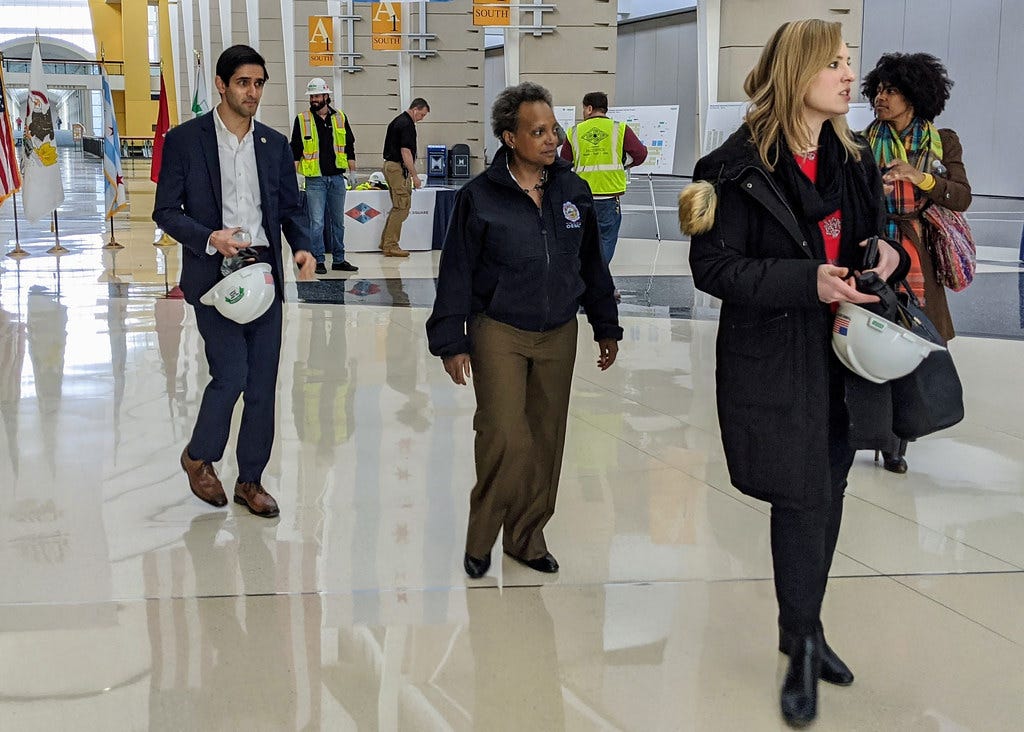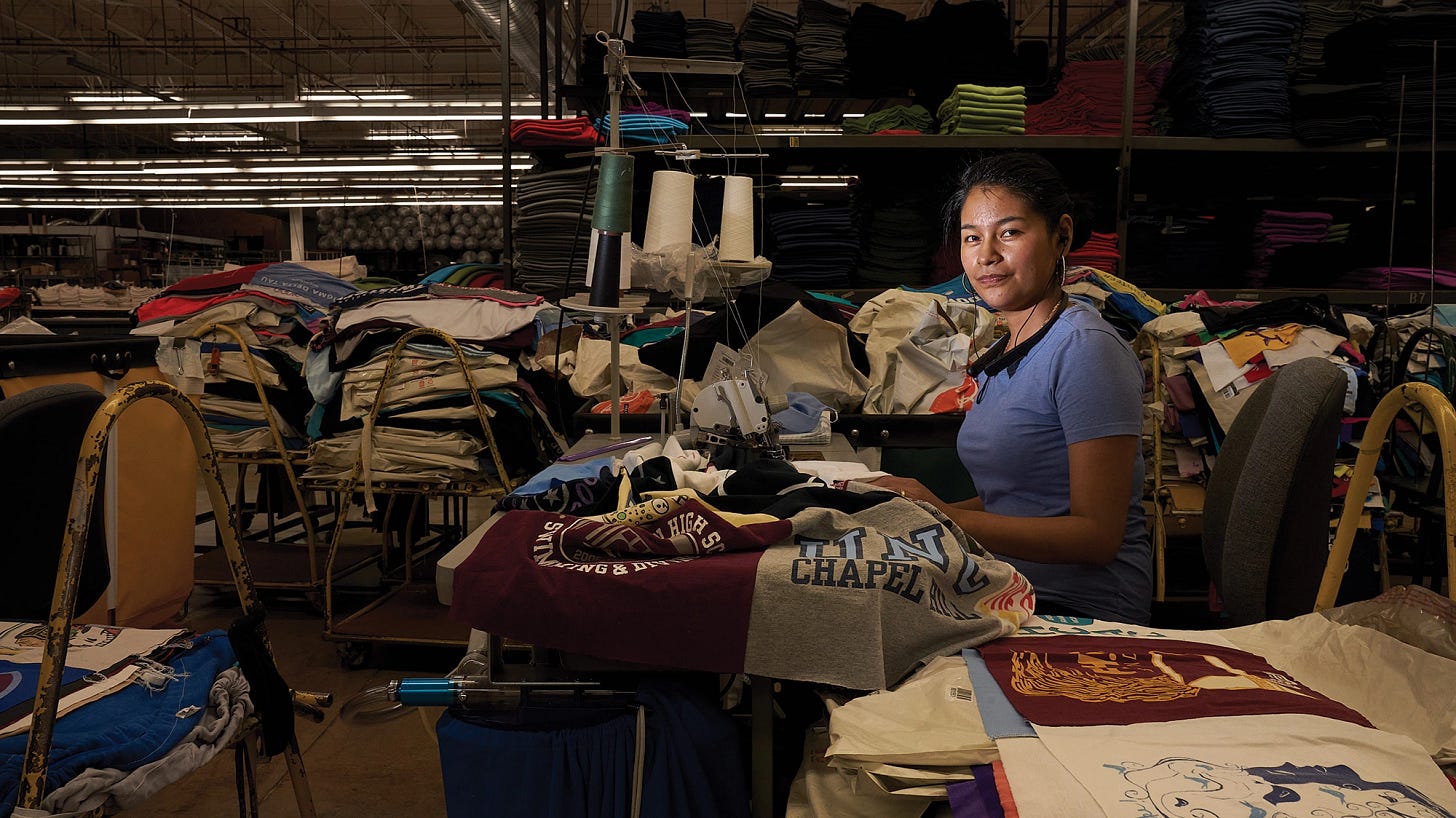Talking pay for play and workers' rights in Chicago
A national economic corruption scandal breaks, with political implications in Illinois and beyond. Meanwhile, as workers win rights at the ballot box, many demand more than the same old grind.
Crypto billionaire scandal exposes moral bankruptcy of pay-for-play politics
By Pastor Chris Butler
In case you haven’t heard, the cryptocurrency industry — the emerging investment mechanism that took off during the Covid pandemic — is in full-blown crisis. That’s because one of crypto’s giants, Sam Bankman-Fried (SBF for short) saw his entire $32 billion company disintegrate and became the target of lots of criticism (and no doubt multiple federal investigations) all within one week.
What happened?
Here’s the saga in a nutshell: Bankman-Fried founded and led a cryptocurrency exchange called FTX. The company let people and companies buy and sell digital currencies, holding billions of dollars worth of those customers' deposits. At the same time, he also ran an investment fund that would itself trade cryptocurrencies. For obvious reasons, the two companies were supposed to be separate. But recently, the investment fund, Alameda Research, needed cash and Bankman-Fried essentially dipped into the FTX customer deposits to get it. This month, some FTX customers became worried about their deposits and rushed to withdraw them, setting off a run on the bank and pushing FTX into bankruptcy.
It is a mess. Comparisons between Sam Bankman-Fried and Bernie Madoff are all over the media and the internet. But, what does any of this have to do with civics and politics in Chicagoland?
Well, before his current situation – seeking transport to a nation that does not have an extradition treaty – Bankman-Fried spent his summer very involved in a few Chicago-area congressional elections. The “Protect Our Future” Political Action Committee, controlled by the (then) crypto billionaire spent almost $1 million boosting candidates of choice in Democratic Party primaries this past June, including more than $500,000 in advertising for Jonathan Jackson in the race to fill the seat vacated by retiring Congressman Bobby Rush on the southside. Bankman-Fried also boosted Rep. Jesus “Chuy” Garcia and now Congresswoman-elect Delia Ramirez.
As a candidate in that first district race, I had a front-row seat to the impact outside spending on Jackson’s behalf had on the election. Things felt close among frontrunners (me not really among them) until television and radio airwaves, roadsides and mailboxes were completely deluged with “Jackson for Congress” materials. In the final weeks of the election, the weeks that matter most, more than $1 million in outside money was spent for Jackson, some of it directly traceable to Sam Bankman-Fried, some not. But all of it was traceable to the cryptocurrency industry.
Bankman-Fried did not just spend his money here in Chicagoland. He invested deeply in congressional races all around the country. In fact, having spent a total of $39.7 million on primary races, SBF was the Democratic Party’s second largest donor, (only George Soros contributed more) and he was the sixth biggest spender overall for the 2022 midterms. Bankman-Fried had pledged to spend up to a billion dollars in the 2024 cycle if Donald Trump sought reelection. Unfortunately for Democrats, the megadonor went bankrupt just before the former President launched his campaign.
While I, like most of you, would love to believe that Sam Bankman-Fried was just so motivated by the Democratic Party’s cause that he poured significant amounts of money into their campaigns, the facts seem to suggest something different. A top SBF lieutenant at FTX, Ryan Salame, was busy investing in the other side of the aisle during the 2022 midterm elections (his $19 million in contributions went to Republicans). And while his stated reason for spending on midterm elections was “pandemic preparedness”, SBF’s lobbying in Congress was all about cryptocurrency regulations like the Digital Commodities Consumer Protection Act, a piece of legislation that many see as creating an unfair advantage for Bankman-Fried’s particular lane in the crypto industry, while giving cover to Congress for having “regulated” crypto without them enacting meaningful reforms.
Voters in the first congressional district of Illinois might have reason to breathe a sigh of relief knowing that a person who purchased such a significant amount of influence with their incoming representative will probably be broke and far away from the nation’s Capitol when the 118th Congress is seated in January. But, while the demise of Sam Bankman-Fried will fill national headlines for a few days, there are dozens of outside donors who want to use their money to control local politics. And if they get their way, our elected officials will use all the best of their limited time and influence attending to the business of their financial backers. By the time they get to the business of the people, they won’t have much time or political capital left to invest.
Sam Bankman-Fried’s business trickery is truly deplorable and will no doubt hurt a lot of people, but the real scandal is how easy it was for SBF to use his ill-gotten wealth to purchase power over our politics. And unlike cryptocurrency, the pay-to-play industry in our government is stable and strong. No one scandal can throw it into chaos. It will take an organized movement of leaders like you and me to bring it down.
The Round Up
Here are the stories that caught our eyes this week and what they mean for the weeks ahead.
Workers’ rights amendment wins place in Illinois Constitution
Proponents of the Workers’ Rights Amendment declared victory this week, asserting that the amendment would ultimately pass with a simple majority of total votes cast on Election Day.
As of this writing, the Associated Press has projected the victory is secure by this lower threshold, with 53 percent of all voters casting a ballot in the election having voted for the amendment.
Earlier in the week, the amendment’s detractors hadn’t yet given up hope that the amendment would fail. With 99 percent of the votes in, the tougher hurdle of 60 percent voting in favor of the amendment appears to be out of reach.
The vote total for the amendment sits at more than 58 percent of voters who cast a ballot on the question, and not enough ballots remain to be counted to reach the higher threshold.
Below, our ownMike Vick shares his thoughts on the issue of workers' rights, and ways that the Workers' Rights Amendment falls short of what workers really need.
Chicago Mayor Lori Lightfoot and her allies on the city council blocked a proposal this week to add a question to the February municipal ballots regarding a proposed sales tax increase on high-end real estate. The revenue would have been earmarked for the construction of low-income housing to address the plight of the estimated 66,000 unhoused Chicagoans.
Lightfoot opposes the measure, despite the fact that she campaigned on it in 2019.
Proponents vowed to fight on, citing the ways this proposal would help address problems associated with homelessness, like drug use and crime, not to mention the moral cost of letting fellow Chicagoans continue to face life on the streets.
The Civic Update will continue to follow efforts to end homelessness in Chicago. If you would like to find ways to help, we encourage you to seek out ministries that focus on this issue in the Chicagoland area.
Aldermen Give Initial OK to $13.5M in TIF Funding To Rehab Six Save-A-Lot Grocery Stores
Members of the Chicago City Council Committee on Finance unanimously green-lit $13.5 million in tax-increment finance dollars to Yellow Banana, LLC, a company planning to lease and rehab six Save-A-Lot grocery stores in the city.
The six stores are located the the south and west sides of Chicago at these locations:
10700 S. Halsted St.
2858 E. 83rd St.
420 S. Pulaski Rd.
4439 W. 63rd St.
7240 S. Stony Island Ave.
7908 S. Halsted St.
A spokesperson for Yellow Banana said the company planned to provide shuttle service to and from the stores in an effort to help elderly customers and others who may not have easy access to vehicles.
The Civic Update has covered the problems of Chicago’s food deserts and the closures and mergers of grocery stores in the Chicagoland area in previous weeks. We’ll continue to follow this issue to bring you the latest developments.
Newsclips
Lightfoot agrees to allow heads of Chicago Public Schools, CTA to testify at City Council meetings
MacKenzie Scott donates nearly $50 million to public schools in Chicago
City council convenes with Chicago mayoral race in the air
Buying a house in Chicago is finally easier — but not cheaper
How one-time meatpacking capital Chicago is becoming a plant-based food manufacturing hub
No holiday cheer for renters as landlords eye tax hikes
Beyond mere workers’ rights in the market, American labor needs to embrace true worker ownership
Now that Illinois has passed the Workers’ Rights Amendment, Illinoisans should get serious about moving past the labor-management fights to true worker autonomy.
By Mike Vick
With the passage of the Workers’ Rights Amendment in this year’s Illinois midterm election, Illinoisans can celebrate a huge step forward for labor protections in the state.
Worker-ownership in the textile industry has taken a job often looked on as poorly-compensated and exploitative, and turned it into a means of escaping poverty and allowing workers power over the value they produce. Image credit: Stacy Kranitz
While imperfect and long overdue, the amendment provides needed safeguards against encroachment on workers rights, which we’ve seen in neighboring states and across the country. Among the most onerous of these attacks are so-called “right to work” laws, passed in more than half of states either by statute or by constitutional amendments.
Opponents of right-to-work laws, myself included, call the concept “right to work for less money and fewer workplace protections,” and studies bear out this claim.
The power of unions in the private and public sectors has steadily eroded since their heyday in the 1930s. The Great Recession and its aftermath led to a resurgence of union activity, but nothing yet rivaling the days when one of America’s major parties paid more than lip service to the cause of labor rights.
Where do we go from here?
The bleakness of the picture in many states as it regards labor rights and union power need not paralyze those of us who want to see a new and better way forward.
Indeed, even the victory of the Workers’ Rights Amendment should not by any means lead us to rest on our laurels.
Union struggles should continue, but given that most of us weren’t alive the last time unions had enough political power to bring the destructive forces of unchecked capitalism to heel, we would do well not simply to repeat the same failed strategies and expect a different outcome.
One increasingly popular way of securing greater power for workers in the marketplace finds its roots in Christian tradition – both in Catholic Social Teaching and in Protestant political theology.
Growing out of both these traditions, Christians and non-Christians alike sought to curb both the excesses of capitalism and to counter authoritarian strains of socialism through a different path that took the best of both systems and jettisoned the worst.
This third way forward, called distributism, entailed putting the power of a business directly in the hands of the people who worked in it. Workers would sidestep the fight between themselves and management entirely by joining or forming their own worker-owned, democratically-run cooperative enterprises.
These types of businesses aren’t merely an academic notion. They exist already across the United States, including right here in Chicago.
Spain’s Mondragon Corporation, one of the largest examples of these types of businesses, consists of thousands of federated cooperatives. It is the seventh-largest Spanish company in terms of asset turnover and tops the list of businesses in its region. By 2019, it employed more than 81,000 people, and has weathered every economic downturn since its founding in 1956.
In Italy, a law that allows ten or more unemployed people to join together and receive a lump-sum loan in the amount of their entire unemployment allotment, on the condition that they use their pooled resources to start a cooperative enterprise, has resulted in a flourishing of cooperatives. In one region of the country, cooperatives account for a third of the total GDP.
My political journey on this issue has taken me from left-of-center Democrat, to independent political advocacy that moves past the excesses of capitalism in favor of a rethinking of our economic system. Even as I occasionally work within the Democratic Party when a candidate worthy of my support steps forward, I find it better to work day in and day out to offer people alternatives to the dead-end roads we’ve traveled before.
If you’d like more information about how to start or join a worker cooperative, check out the Democracy at Work Institute and its initiative, Becoming Employee Owned.








